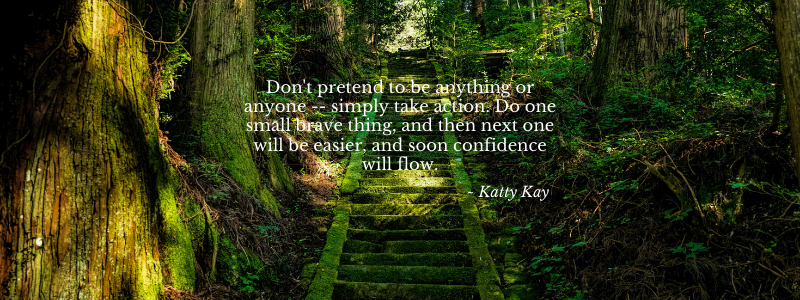In a world where outward appearances often hold significant weight, the adage “Fake It ’Til You Make It” resonates strongly with those embarking on a journey of personal and spiritual growth. Beyond its surface-level implications, this mantra invites individuals to reflect deeply upon the essence of authenticity and the cultivation of spiritual qualities. Within the Bahá’í teachings, the intertwining of personal development and authentic self-expression underscores a profound philosophical narrative, embodying the delicate balance between outward comportment and inner enlightenment.
One of the foundational teachings of the Bahá’í Faith is the belief in the inherent nobility of all individuals. Each person is endowed with the capacity for spiritual growth and transformation. As one delves into the essence of spiritual qualities, they may encounter the idea that cultivating virtues such as love, patience, and humility may, at times, require an initial act of will. Herein lies the intriguing concept of “faking it”—an intentional practice of embodying these virtues even when they may not initially reflect one’s internal state.
The notion of embodying spiritual qualities is not merely an exercise in superficiality; rather, it represents an earnest commitment to self-improvement. It acknowledges that the manifestation of virtues can often precede the authentic feeling of these qualities. Through such an approach, individuals may engage in practices conducive to transforming their internal landscape. For example, the conscious decision to act with kindness, even when one feels disconnected, can gradually lead to a genuine transformation of the heart.
From a Bahá’í perspective, spiritual growth necessitates a proactive approach. The requirements of spiritual advancement often call for conscious effort and deliberate action. This is where the concept of “faking it” finds its deeper purpose—serving as a catalyst for internal change. As individuals begin to align their actions with the virtues they aspire to embody, they may discover a profound connection between outward behavior and internal transformation. This phenomenon elucidates a critical aspect of human psychology: the power of action in shaping emotional states and perceptions.
Furthermore, the Bahá’í writings emphasize the importance of a community context in fostering spiritual qualities. Engaging with others who share a commitment to growth creates a supportive environment where individuals can draw inspiration and encouragement. In this communal journey, the collective effort to “fake it” becomes a shared narrative of growth, wherein each member nurtures their capacity to embody virtues through mutual encouragement and accountability. The interdependence of individuals within a community highlights another layer of the Bahá’í understanding of personal development—the necessity of relationships and the role of mutual support in fostering spiritual qualities.
Moreover, the process of growth in spiritual qualities reflects a dynamic interplay between intention and actualization. The journey is not linear; rather, it encompasses cycles of aspiration, action, and reflection. Individuals may experience setbacks or periods of stagnation, yet the idea of persevering in the practice of embodying virtues can yield unforeseen insights and revelations. The act of decision-making—choosing to respond to life’s challenges with grace, empathy, and resilience—is a deliberate form of spiritual engagement that transcends mere façade. It transforms actions into a formative experience, wherein each choice catalyzes further awakening and awareness.
As the individual approaches this transformative process, it is essential to consider the role of self-compassion. In the Bahá’í teachings, one is reminded that striving for perfection is not a precondition for spiritual worthiness. Instead, recognizing one’s limitations and embracing the journey of growth with kindness fosters an environment conducive to authentic self-expression. This compassionate acknowledgment enables individuals to navigate the complexities of their spiritual journey without falling into the traps of self-judgment or despair.
Intriguingly, the practice of “faking it” can also serve as a spiritual exercise in humility. It invites individuals to recognize their imperfections and to accept the ongoing nature of spiritual growth. In this light, the act of embodying virtues that may not yet feel authentic becomes a form of surrender to a higher purpose. By engaging in this practice, one acknowledges that personal development is a lifelong endeavor that requires commitment, patience, and openness to change.
The Bahá’í perspective on personal growth invites individuals to view the journey as an unfolding process that extends beyond negative self-judgment. It fosters an appreciation for the rhythms of growth, emphasizing that flourishing spiritually is not confined to the manifestation of ideal qualities; rather, it exists in the space between intention and actualization. Herein lies the greater realization: the authentic process of personal development is intricately woven into the fabric of community, compassion, and connection to a higher purpose.
Ultimately, the pursuit of spiritual qualities through the practice of “faking it” serves as a poignant reminder of the power inherent in human agency. It highlights the potential for transformation rooted in intentional action and genuine engagement with one’s community. In the context of Bahá’í teachings, this process does not merely constitute a means to an end but signifies a deeper intention—a collective striving toward a spiritually infused existence characterized by love, unity, and authenticity.
As individuals navigate the path toward spiritual growth, the cultivation of virtues—however performative at first—unfolds into a profound journey of self-discovery. The realization that one can indeed “fake it” until they “feel it” not only opens the door to personal transformation but also offers a powerful vehicle for contributing to the greater movement toward unity and harmony within the human family.
